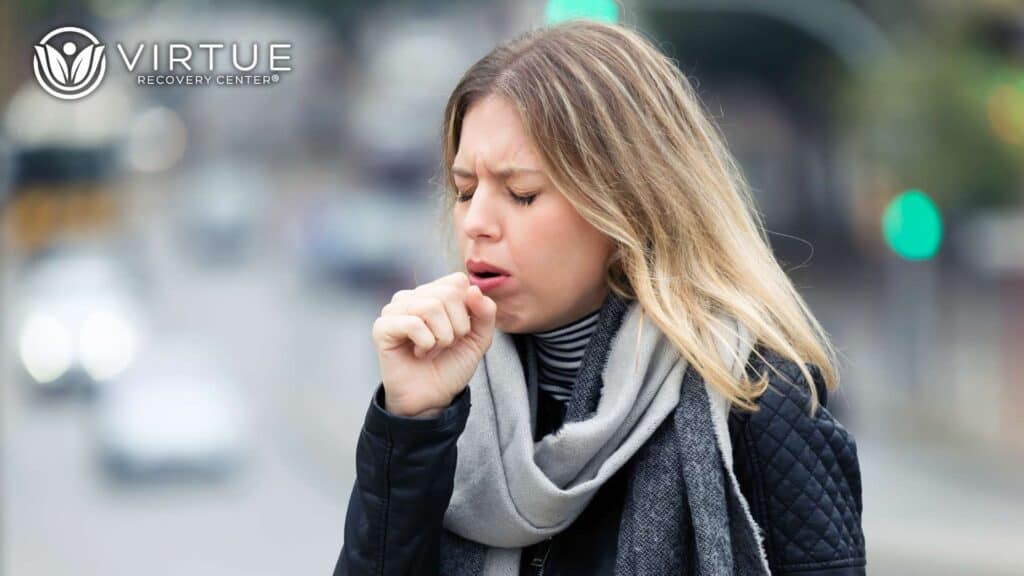Key Takeaways:
- DXM (Dextromethorphan) is found in over-the-counter (OTC) cough syrups and can cause dangerous hallucinogenic effects when abused.
- DXM addiction occurs when people misuse cough syrup for its psychoactive properties, leading to physical and psychological dependence.
- DXM misuse can result in serious health problems such as liver damage, hallucinations, and withdrawal symptoms.
- Effective addiction treatment for DXM abuse includes medical detox, therapy, and mental health support to help individuals recover.
- Professional help is available at Virtue Recovery Chandler to guide individuals through addiction recovery from DXM abuse.
Introduction
DXM (Dextromethorphan) is an active ingredient found in many over-the-counter (OTC) cough syrups and cold medicines. It is a cough suppressant used to treat common colds, but it can have hallucinogenic effects in high doses. This misuse is referred to as “robo-tripping” or “Triple C” abuse.
When someone uses DXM at much higher doses than recommended, it can lead to addiction and substance use disorder. The appeal of the psychoactive effects of DXM often masks the serious risks involved, including liver damage, hallucinations, and long-term physical and mental harm. This article will explain the dangers of DXM abuse, the signs of addiction, and how to seek addiction treatment.
What is DXM and How is it Misused?
Dextromethorphan (DXM) is a common ingredient in cough suppressant medications, such as cough syrups and cold medicines. It is safe when used in small, recommended doses to treat coughing. However, when taken in large amounts, DXM acts as a dissociative drug, causing users to feel detached from their surroundings.
Many people misuse DXM for its hallucinogenic effects, leading to DXM abuse. Users may consume high doses of cough syrup, pills, or gels to get a “high” similar to that of stronger dissociative drugs like PCP. This misuse is common among teenagers and young adults seeking cheap, legal ways to experience altered perceptions. Unfortunately, this abuse can lead to serious health problems, including DXM addiction.
Signs and Symptoms of DXM Abuse
When someone misuses DXM, they may exhibit both physical and mental symptoms. These include:
- Hallucinations: Seeing or hearing things that aren’t real.
- Dissociation: Feeling disconnected from reality, like watching yourself outside your body.
- Dizziness and confusion: Difficulty thinking clearly and staying focused.
- Slurred speech and loss of motor skills: Problems with coordination and speaking.
- Increased heart rate and blood pressure: Signs of the body’s physical response to the drug.
Repeated misuse of DXM can lead to dependence, meaning the person feels they need the drug to function. Over time, this dependence can turn into DXM addiction, making it hard to stop using the drug even when it’s harming their health.
The Dangers of DXM Abuse
DXM misuse is dangerous, particularly when taken in high doses or combined with other substances like alcohol or drugs. Some of the main risks of DXM abuse include:
- Liver damage: Many DXM products contain acetaminophen, which can cause serious damage to the liver when taken in large amounts.
- Hallucinations and paranoia: Long-term DXM misuse can lead to frightening hallucinatory experiences, anxiety, and paranoia.
- Memory problems: People who misuse DXM may struggle to remember or concentrate.
- Overdose: Taking too much DXM can lead to an overdose, causing symptoms like extreme drowsiness, vomiting, irregular heartbeat, or even seizures.
- Withdrawal symptoms: Individuals who try to stop using DXM after long-term abuse may experience withdrawal symptoms such as depression, mood swings, and cravings for the drug.
In severe cases, an overdose of DXM can be fatal. Recognizing the dangers and getting professional help as soon as possible is crucial.
DXM Addiction Treatment Options
Recovering from DXM addiction requires professional intervention. A comprehensive addiction treatment program can help people safely overcome their dependence on DXM and address the underlying causes of their substance use disorder. Here are the key components of DXM addiction treatment:
- Medical Detox: This is often the first step in treating DXM addiction. Medical professionals help the individual safely withdraw from the drug, managing any withdrawal symptoms that may occur.
- Inpatient Treatment Programs: These programs provide a structured environment where individuals can receive 24-hour care. Inpatient rehab is particularly useful for those with severe addiction who need a higher level of support.
- Outpatient Treatment: Outpatient programs offer flexibility, allowing individuals to receive therapy while living at home. This is ideal for people who have a supportive home environment and are managing milder addictions.
- Therapy and Counseling: Therapy, such as Cognitive Behavioral Therapy (CBT), is essential for understanding the emotional reasons behind DXM misuse and for developing coping strategies to avoid relapse.
- Support Groups: Group support, such as 12-step programs, provides emotional encouragement and a sense of community during recovery.
How to Get Help for DXM Addiction
If you or a loved one is struggling with DXM abuse, it’s important to seek professional help. DXM addiction can have long-lasting effects on both physical and mental health, but recovery is possible. At Virtue Recovery Chandler, our team specializes in helping individuals overcome DXM addiction through personalized treatment plans.
We offer a range of treatment options, including inpatient care, medical detox, and outpatient therapy. We aim to provide the support and tools needed to break free from addiction and start living healthier lives.
If you or someone you care about is battling DXM addiction, don’t hesitate to reach out. Call 866-338-5779 today to speak with one of our specialists and learn more about how our treatment programs can help.
Conclusion
While DXM is an effective cough suppressant when used correctly, misusing it can lead to dangerous and life-altering consequences. DXM abuse not only impacts physical health, causing problems like liver damage and hallucinations, but it can also lead to addiction and long-term mental health struggles.
The good news is that DXM addiction is treatable with the right approach. Seeking professional help through a structured addiction treatment program is the best way to break free from DXM misuse and start the path toward recovery.
At Virtue Recovery Chandler, we are here to guide you through your recovery journey. Call us at 866-338-5779 to get started on your journey to health and wellness today.
FAQs About Dextromethorphan Use Disorder & Treatment for DXM Abuse
What is DXM, and why is it abused?
DXM (Dextromethorphan) is a cough suppressant found in many OTC cough syrups. When taken in high doses, it can be abused for its hallucinogenic effects.
What are the dangers of DXM abuse?
DXM misuse can lead to serious health risks such as liver damage, hallucinations, and addiction. High doses can result in overdose or long-term psychological effects.
Can you get addicted to DXM?
Yes, DXM is addictive, especially when misused for its psychoactive effects. DXM addiction can develop, leading to substance use disorder.
How is DXM addiction treated?
Treatment for DXM addiction involves medical detox, therapy, and ongoing support through either inpatient or outpatient treatment programs.
Why should I seek professional help for DXM addiction?
Professional help ensures safe detox, provides therapy for underlying issues, and helps individuals avoid relapse by building coping strategies.
What are the effects of DXM misuse?
Misuse of DXM (dextromethorphan) can result in hallucinations, dissociation, and impaired motor function, often accompanied by dangerous psychological symptoms. Long-term abuse of DXM can lead to addiction, cognitive issues, and negative impacts on mental health services.
When is DXM use appropriate?
DXM is appropriate when taken in recommended amounts as an over-the-counter cough suppressant for temporary relief from cough due to colds or flu. Excessive use of DXM for recreational purposes crosses into drug abuse territory.
What drugs include DXM?
DXM is often found in over-the-counter cough medications such as Robitussin, NyQuil, and Delsym. These medications are designed for short-term relief but are sometimes misused in large amounts for recreational effects.
Do I need drug detox and rehab for DXM addiction and abuse?
If you are dependent on DXM or engaging in drug abuse, detox, and rehab may be necessary to address both the physical and psychological symptoms of addiction. Comprehensive treatment helps manage withdrawal and supports long-term recovery.
How harmful is DXM?
DXM can be highly harmful when misused, leading to side effects such as hallucinations, confusion, rapid heart rate, and even DXM overdose in severe cases. Long-term abuse can damage both physical and mental health.
Can DXM be used as a drug?
Yes, DXM is often misused as a recreational drug due to its dissociative and hallucinogenic effects when taken in large amounts. Such abuse of DXM can result in addiction and serious health risks.
What are the long-term effects of dextromethorphan?
Long-term use of DXM can result in cognitive decline, memory issues, and psychological dependence. Chronic abuse may also increase the risk of developing mental health conditions and damage to organs such as the liver.
What is the street use of dextromethorphan?
Dextromethorphan is commonly misused on the street as “Robo” or “Skittles,” with people consuming high amounts of DXM from over-the-counter cough medications experiencing dissociative or hallucinogenic effects.
Is DXM an opioid?
No, DXM is not classified as an opioid. However, it shares some effects, such as suppressing cough, but at higher doses, it causes dissociative effects more similar to hallucinogens than opioids.
How much DXM causes an overdose?
A DXM overdose can occur when large amounts of DXM are consumed, typically above 1,000 mg or more, depending on an individual’s tolerance and history of substance abuse. Symptoms include vomiting, rapid heart rate, and hallucinations.
Is dextromethorphan a hallucinogen?
In high doses, dextromethorphan can act as a hallucinogen, leading to visual and auditory distortions, dissociation, and altered perception of reality. This makes it a target for recreational drug abuse.
How addictive is cough syrup?
Cough syrup containing DXM can be addictive when misused for its psychoactive effects. Over time, individuals may become dependent on DXM, leading to substance abuse or addiction.
Why is dextromethorphan restricted?
Dextromethorphan is restricted in some regions due to its potential for misuse, particularly among young people. Its ability to cause psychological symptoms and hallucinogenic effects makes it a substance of concern for abuse.
Is dextromethorphan hard on the liver?
Yes, high doses of dextromethorphan, especially when combined with alcohol abuse or other medications, can be hard on the liver and lead to liver damage over time.
Is dextromethorphan bad for your heart?
Dextromethorphan can be harmful to the heart when abused in large quantities, leading to increased heart rate, high blood pressure, and even heart arrhythmias.
Is dextromethorphan safe to take daily?
Dextromethorphan is not intended for long-term or daily use. Daily consumption, especially in large amounts, can lead to dependence on DXM and other health risks.
What are the withdrawal symptoms for DXM detox?
Withdrawal symptoms from DXM detox can include anxiety, irritability, nausea, and cravings. Psychological symptoms like depression or mood swings may also occur, especially in individuals with a history of substance abuse.
How Does Xylazine Abuse Compare to DXM Addiction, and How is it Treated?
Xylazine abuse and DXM addiction differ in their effects on the body and mind. Xylazine is a powerful animal tranquilizer, while DXM is a common ingredient in over-the-counter cough medicines. Treatment for Xylazine abuse often involves detox, counseling, and support groups. DXM addiction may be treated with behavioral therapy and medication. Understanding the rise of tranq among users is crucial in addressing these issues.
Resources
https://www.ncbi.nlm.nih.gov/pmc/articles/PMC2925345/
https://www.dea.gov/sites/default/files/2020-06/DXM-2020.pdf
https://www.justice.gov/archive/ndic/pubs11/11563/11563p.pdf








